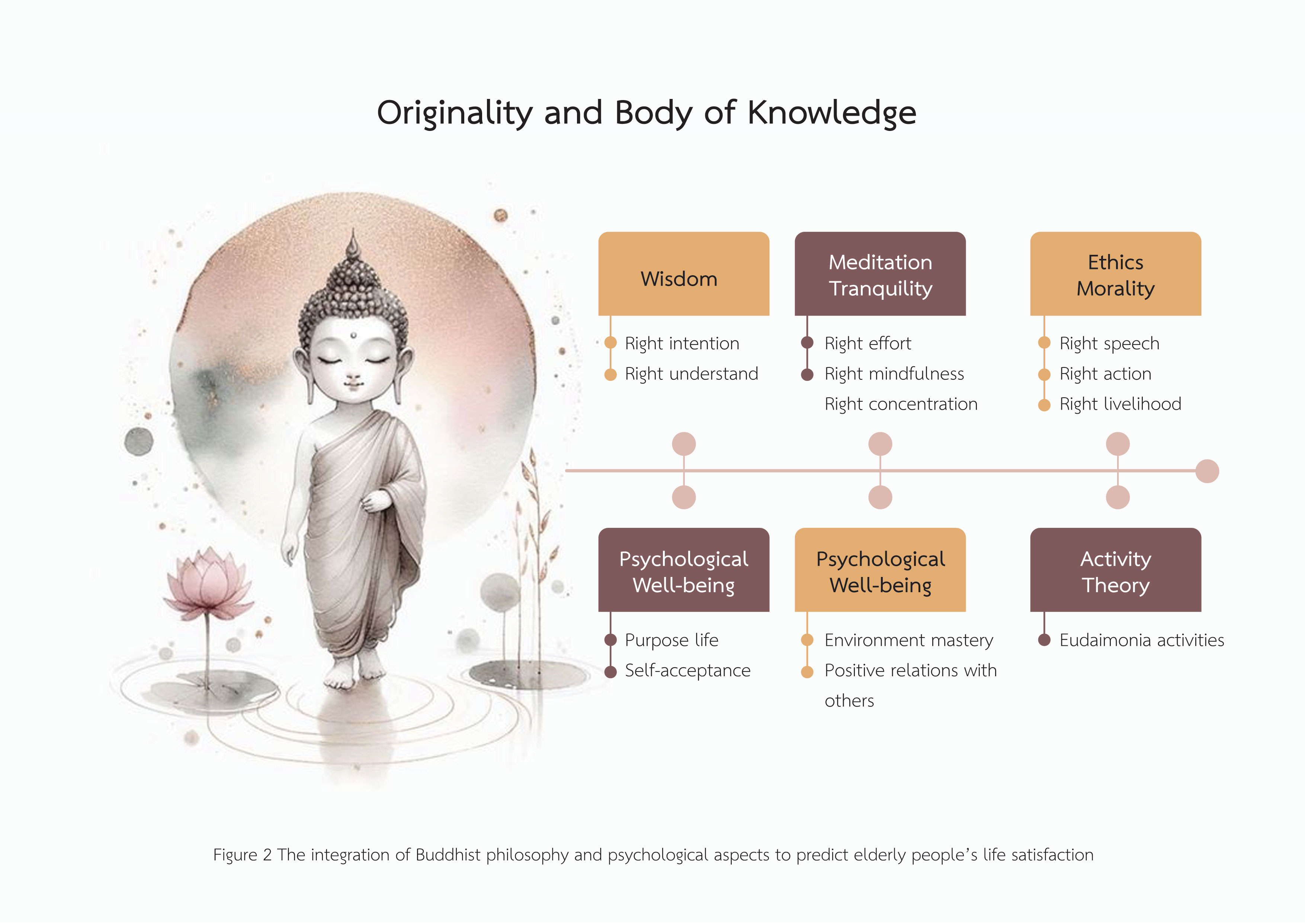FACTORS OF LIFE SATISFACTION AND PSYCHOLOGICAL WELL-BEING AMONG ELDERLY PEOPLE LIVING IN PAK PHAYUN DISTRICT, PHATTHALUNG PROVINCE
Keywords:
Hedonia, Eudaimonia, Life Satisfaction, Psychological Well-being, Elderly PeopleAbstract
Background and Objectives: Thailand along with many developed and developing nations faces a rapidly aging population. According to World Health Organization, over 11 million Thais, representing 17.57% of the population, are classified as elderly. This demographic shift necessitates a deeper understanding of factors influencing well-being in this growing segment. The Activity Theory provides a foundational framework for this research. The theory posits that continued engagement in activities, particularly during later life, contributes to positive psychological well-being and life satisfaction in elderly people. Culture influences decision making; therefore, cultural and religious belief in term of the collectivism helping others as doing good (Eudaimonia) and staying as a group may increase life satisfaction and psychological well-being than seeking pleasure activities (Hedonia) e.g., listening music, go shopping. There are two objectives on this research: Firstly, studying behavioral factors and psychological well-being influencing on life satisfaction of elderly people residing in Pak Phayun District, Phatthalung Province; and secondly, utilizing a behavioral and psychological well-being model to predict life satisfaction of elderly people residing in Pak Phayun District, Phatthalung Province.
Methodology: Employing a quantitative approach, the study analyzed data from 299 Thai elderly. Descriptive statistics were used to summarize participant characteristics. Inferential statistics, including t-tests and ANOVA, were utilized to examine potential differences in means between groups based on activity engagement levels. Multiple regression analysis was conducted to explore the predictive power of activity engagement (Both Eudaimonia and Hedonia) on life satisfaction and various domains of psychological well-being.
Main Results: The findings revealed a significant positively association between both Eudaimonia and Hedonia with life satisfaction and most psychological well-being domains. However, the link with autonomy and personal growth was lowly associated for participants primarily engaging in Hedonia. Interestingly, Eudaimonia emerged as a strong predictor of life satisfaction and psychological well-being, particularly for purpose in life and positive relationships.
Involvement to Buddhadhamma: The connection between Eudaimonia and psychological well-being domains aligns with Buddhist teachings on overcoming suffering through meaningful action and positive relationships. The Noble Eightfold Path, a core Buddhist concept, emphasizes right livelihood (Engaging in meaningful work or activity) and right relationships (Cultivating positive connections with others). The focus on Eudaimonia and social connection identified in this research resonates with these Buddhist principles, suggesting potential cultural and religious influences on the impact of activities on psychological well-being. Future investigations could explore the potential moderating role of cultural and religious beliefs in the relationship between activity engagement and psychological well-being.
Conclusions: Thailand's aging population had shifted a focus on how to keep elderly people happy and healthy due to the aging population's increasing. This study examined how activities influenced the psychological well-being and satisfaction in life of 299 elderly people. The research found that both activities focused on personal enjoyment (Hedonia) and activities focused on helping others and community (Eudaimonia) were positively linked to psychological well-being particularly purpose in life and social connection. However, engaging in activities for personal growth and independence seemed less important for those who primarily participated in pleasure-seeking activities. This focus on social connection and activities that contributed to a sense of purpose was particularly interesting when considering Thailand's Buddhist culture. Buddhist teachings emphasized overcoming suffering through meaningful action and fostering positive relationships. The study suggested that cultural and religious beliefs might have played a role in how activities impacted psychological well-being in Thai elderly people. Future research could have explored this connection in more detail, potentially leading to social programs and community service designed to promote meaningful activities for this population. This study was limited by its cross-sectional design, precluding causal inferences. It might have not definitively stated whether activity engagement led to higher well-being or vice versa.
References
Calderson, Jr. R., Kim, G., Ratsameemonthon, C. & Pupanead, S. (2020). Assessing the Adaptation of a Thai Version of the Ryff Scales of Psychological Well-Being: A PLS-SEM Approach. Psychology, 11(7), 1,037-1,053. https://doi.org/10.4236/psych.2020.117068.
Carstensen, L. L. (2021). Socioemotional Selectivity Theory: The Role of Perceived Endings in Human Motivation. The Gerontologist, 61(8), 1188-1196.
Erikson, E. H., Erikson, J. M. & Kivnick, H. Q. (1986). Vital Involvement in Old Age. New York, United States of America: W. W. Norton & Company.
Kim, J. H. & Kim, M. S. (2021). The Effects of Spiritual Well-Being and Creative Self-Efficacy on Life Satisfaction among Older Adults. Journal of Happiness Studies, 22(3), 1729-1748.
Kochanski, G. S. (2019). The Arts and Aging: A Review of The Literature on the Effects of Arts Programs on Cognitive Function and Well-Being in Older Adults. International Journal of Aging and Human Development, 88(3), 339-352.
Pavot, W. & Diener, E. (2013). Happiness Experienced: The Science of Subjective Well-Being. In David, S., Boniwell, I. & Ayers, A. C. (Eds.), The Oxford Handbook of Happiness (pp. 134-151). Oxford, United Kingdom: Oxford University Press.
Schwartz, C. E. & Halliday, W. G. (2020). The Restorative Power of Social Connection: Examining the Links between Social Support, Gratitude, and Life Satisfaction among Older Adults. Journal of Aging and Health, 32(7-8), 822-833.
Sirgy, M. J., Diener, E. & Wu, D. (2020). The Future of Subjective Well-Being Research. The Journal of Positive Psychology, 15(6), 741-750.
Steger, M. F., Kashdan, T. B. & Oishi, S. (2008). Being Good by Doing Good: Daily Eudaimonic Activity and Well-Being. Journal of Research in Personality, 42(1), 22-42. https://doi.org/10.1016/j.jrp.2007.03.004.
United Nations Economic and Social Commission for Asia and the Pacific (UNESCAP). (2017). Enhancing Well-Being in Ageing Societies in Asia and the Pacific. Bangkok, Thailand: United Nations Economic and Social Commission for Asia and the Pacific.
Zuo, S., Wang, W., Wang, F. & Shi, X. (2017). The Behavioural Paths to Well-Being: An Exploratory Study to Distinguish between Hedonic and Eudaimonic Well-Being from an Activity Perspective. Journal of Pacific Rim Psychology, 11(10), 1-13. https://doi.org/10.1017/prp.2017.1.

Downloads
Published
How to Cite
Issue
Section
License
Copyright (c) 2024 Journal of Buddhist Anthropology

This work is licensed under a Creative Commons Attribution-NonCommercial-NoDerivatives 4.0 International License.








